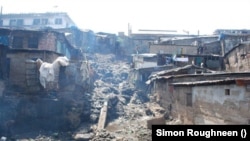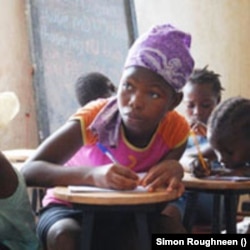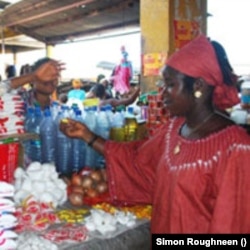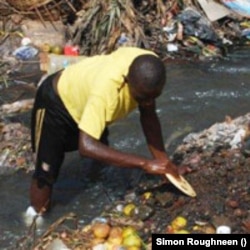“The police stop us all the time. Sometimes they try to take money from us, sometimes they threaten to arrest us. But the usual trick is to check our handbags. They plant some drugs, then tell us to come with them to the station. The only way to get out is have sex with the policeman, otherwise we go to jail.”
Just 20 years old, Maryama* has lived on the ramshackle streets of Sierra Leone's capital, Freetown, for eight years. Her father died when she was 10 – possibly from HIV-AIDS, although nobody knows for sure – leaving her mother unable to bring up their three children. This was at the height of Sierra Leone's civil war, infamous for anti-government rebels who hacked off arms and hands to deter civilians from voting in elections.
Government-allied militias believed that their magic rendered them invisible and invulnerable in battle against the rebels who funded their war with “blood diamonds” smuggled out of the country and sold on at profit. The mainstream diamond industry and its customers turned a blind eye to the suffering caused by the fighting.
Now the country is peaceful and the diamond trade better regulated. The 2007 elections saw an orderly transfer of control to the winning party, and the economy is growing at around 5% a year. War seems a distant memory, brought to mind only by the sight of war amputees on Freetown's bustling streets. Their arm (and sometimes leg) stumps are a physical testament to what was a notoriously vicious war, fought at close quarters with AK-47s and sharp blades. Around 50,000 people were killed, mostly non-combatants.
Corruption takes a toll
Starting in 1992, the fighting devastated much of the country. It ended only after British military intervention in 2000, which earned Tony Blair an honorary chieftaincy from the Freetown government. Despite a wealth of natural resources, the average per capita annual income in Sierra Leone is only US$240 per person.
The country ranks at or near the bottom of most global indexes of poverty and corruption. These rankings are not mere abstractions. Behind them lies a harsh and sordid reality. Poverty is part of the reason why young women like Maryama end up on the streets, and corruption makes their life even more miserable.
Speaking at an investment conference held in London recently, Sierra Leone Prime Minster Ernest Bai Koroma cited some high-profile anti-corruption arrests as evidence that foreign investors can expect cleaner government in his resource-rich country. Although many see the arrests as a good start, they will not by themselves stem the low-level graft and exploitation that makes life tough for Sierra Leoneans.
Kids turn to sex work to survive
Girls often have little or no protection from violent or abusive men or recourse against those who refuse to pay.
“If we have trouble from a customer, we cannot go to the police,” says Maryama. “The guy will just pay the cops off, and then they will turn on us, taking our money or taking us to station.”
Some help for the street kids comes from the humanitarian agency Goal. Besides working on water supply and sanitation in Freetown slums and in rural areas, it operates rescue programs for young, abandoned children.
GOAL has an outreach and education project for young women such as Maryama, offering alternatives to the grimy, precarious street existence. Many of those who have already completed the course now run a variety of small businesses, enabling them to “get out of the game,” as recent graduate Zainab put it.
“GOAL provided some small business training, and a cash grant to help me get started. Now I can turn a profit of around 100,000 Leone (around $30) a month,” she said.
Zainab sells basic grocery items from a four-foot wide stall at a market in Freetown's traffic-choked eastern districts. She plans to travel to neighboring Guinea soon to purchase hard-to-find kitchen utensils at a rock-bottom price. She’ll then sell these for a small profit back in Freetown and repeat the cycle to expand the business.
“Anything is better than working on the streets,” she says.
Some basic education
More than 30 percent of Sierra Leoneans go without formal education at any level. With parents unable to pay school fees, GOAL steps in with incentives to get girls and women off the streets and into the classroom.
Vera, who’s 19, chose the back-to-school option after she finished the program. Like many others in the program, she has been reunited with her family after mediation carried out by GOAL.
Vera’s home is located down a seemingly endless maze of potholed, winding, unpaved streets through Freetown's Marbella slum. It’s a collection of tin shacks, rubbish, open drains and rainy season flooding. The refuse runs downhill to what is the third largest natural harbor on earth and then to the open sea.
High school classes usually run in the afternoon in Sierra Leone. Limited school space means that primary classes run in the morning, followed by older students in the afternoon, using the same classrooms.
“GOAL pays my school fees”, she said.
Although older than some of her classmates, Vera is clearly proud to be getting a formal education.
“I was in school for just two years of my life, when I was eight and nine. It is a joy to attend classes. I finished 15th out of 86 pupils last year,” she said.
Overall, educational facilities and opportunities are lacking in Sierra Leone. According to Britain’s Department for International Development (London's counterpart to USAID), 70 percent of women and 50 percent of men are illiterate.
Bonds formed through hardship
In between instructor tips on procuring wholesale stock for a range of small businesses, the girls and women crack bawdy jokes in Krio, a type of Creole mixing English, Portuguese and local languages. They exchange anecdotes about customers, who apparently range from local politicians to South Korean sailors to Nigerian businessmen and others.
Despite the traumas some of them have gone through, they seem resilient and determined to make their lives better. Though in some, the occasional shy, downward glance betrays an inner sadness.
One of the girls, Sara, says one of her friends died last year after contracting HIV-AIDS from an infected customer.
Street talk is a key communications medium, and word is spreading about the life-altering potential offered by the GOAL project. Maryama heard about it from Zainab, and she enrolled because she saw the project's success personified in her friend.
Maryama is among the latest group of women and girls in the GOAL project, which teaches the basics of business start-up and entrepreneurship.
“They are three weeks into the schedule,” says Christiana Cole, a social worker and GOAL Outreach Coordinator in Sierra Leone. She believes that “all girls want to get off the streets, they all want the lifestyle change that comes with that, but at first many cannot believe that the alternative will work.”
But the classroom was half-empty, with only14 girls sitting on faded benches, blue paint flaking off them, in the humid classroom. Many more had enrolled.
Cole said, “This time around we have 40 girls, but now I think quite a few of them are 'hustling' on the streets.”
Success is neither immediate nor guaranteed.
“There is money to be made from selling sex at this time of year,” said Cole, “but part of the challenge for GOAL is to show that with our help and their own motivation, the girls can earn a living another way.”
* Pseudonyms have been used throughout this article









